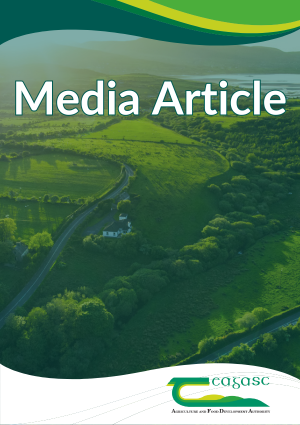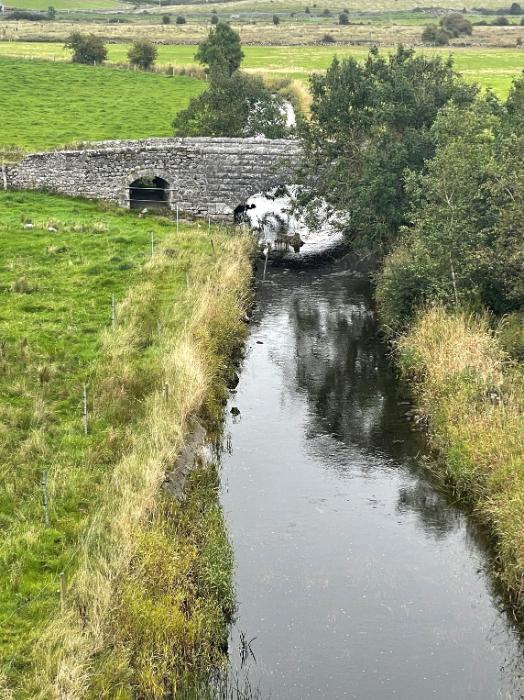
Water Quality is an Issue too important to Ignore
Water Quality is an Issue too important to Ignore 16 December 2024 Type Media Article By Sinead Devaney, ASSAP Adviser, Teagasc Galway/Clare “All sectors of Irish agriculture will have to implement practice change to achieve the desired improvements in Ireland’s water quality status”, Director of Research in Teagasc, Professor Pat Dillon, told a packed house […]
By By Sinead Devaney, ASSAP Adviser, Teagasc Galway/Clare

Water Quality is an Issue too important to Ignore
Type Media Article
By Sinead Devaney, ASSAP Adviser, Teagasc Galway/Clare
“All sectors of Irish agriculture will have to implement practice change to achieve the desired improvements in Ireland’s water quality status”, Director of Research in Teagasc, Professor Pat Dillon, told a packed house at the Teagasc National Dairy Conference in Limerick last month.
In Ireland, water quality targets are set under the Water Framework Directive, which requires all waters to reach ‘good’ or ‘high’ ecological status by 2027. Currently 54% of Irish water bodies are of ‘good’ or ‘high’ ecological status. Agriculture is a significant pressure in 1,023 of the 1,649 water bodies that the Environmental Protection Agency (EPA) has identified as being ‘at risk’ to water quality. However, two-thirds of these also have other significant pressures.
Agriculture is the main pressure affecting water quality in Ireland, as Agriculture is the largest land-use in Ireland. The next greatest pressures then are hydromorphology (channelisation), urban wastewater and forestry.
So we have great scope for improvement, and the agricultural industry and farmers have a big role to play in this. There are supports available to help.
Teagasc Better Farming for Water Campaign
Teagasc recently launched a Teagasc Better Farming for Water campaign highlighting 8-Actions for Change.
The ‘Better Farming for Water’ campaign will build on existing water quality programmes such as ACRES, ASSAP, Agricultural Catchments Programme, Farming for Water EIP, Waters of LIFE, Blue Dot Catchments, Slaney project (and others) to improve water quality. The multi-actor (farmers, advisors/researchers, agri-food industry, community, government) approach to support farmers will ensure that challenges and solutions to address local water quality are delivered at farm, catchment and regional scale. This campaign is part of a wider whole-of-government approach to improve water quality.
The objective of the ‘Better Farming for Water’ campaign will be to support all farmers to reduce the loads of nitrogen, phosphate, sediment and pesticides entering our river network through either diffuse or point source pathways from agricultural sources.
The 8-Actions for Change of the campaign aim to:
- Reduce purchased nitrogen (N) and phosphorus (P) surplus per hectare.
- Ensure soil fertility is optimal for lime, phosphorus and potassium.
- Ensure application of fertiliser and organic manure at appropriate times and conditions.
- Have sufficient slurry and soiled water storage capacity.
- Manage and minimise nutrient loss from farmyards and roadways.
- Fence off watercourses to prevent bovine access.
- Promote targeted use of mitigation actions such as riparian margins, buffer strips and sediment traps to mitigate nutrient and sediment loss to water.
- Maintain over-winter green cover to reduce nutrient leaching from tillage soils.
Farming for Water EIP
The new Farming for Water EIP is a European Innovation Partnership (EIP) which will provide €50 million to some 15,000 farmers up to the end of 2027 to implement a range of measures designed to help improve water quality. It may provide funding for measures such as stream fencing, alternative water supply, nose pumps, solar pumps, fenced margins, riparian buffer zones, hedge and tree planting etc., for farms within Priority Areas for Action. There are over 40 measures to choose from which include completing a rainwater management plan, a farmer training course and a Nutrient Management Plan. This grant aid is targeted to specific Priority Areas for Action (PAAs). Farmers will be consulted by their ASSAP advisor, and informed as to how best to approach the measures to be taken on their lands, before making the straightforward application and availing of the grants.
Measures that can be taken on every farm this winter
- In the farmyard in wintertime (and all year round), ensure that clean water is diverted away from soiled yards and out the field. Avoid clean water going in to slatted tanks and taking up much-valued tank space, which is required for storing slurry.
- Also, check that there are no dripping taps, leaking troughs, or pipework, which could be seeping clean water into tanks.
- You can check out the water quality status of your local waterbody on catchments.ie.
- Talk to your ASSAP Advisor to see if you are in a Priority Areas for Action (PAA), which may allow you to avail of funding through the Farming for Water EIP, to make water quality improvements on your farm.
The Agricultural Sustainability Support and Advisory Programme or ASSAP is a free and confidential advisory service for farmers in priority areas for action. The aim of the programme is to support farmers to implement actions on their farms to help improve water quality.
For more information you can contact me: Sinéad Devaney, ASSAP Advisor Teagasc, Deerpark, Ballinasloe, Co. Galway H53HX21 Phone 0909642456 or (087) 2229634, Email sinead.devaney@teagasc.ie

Dooyertha River, Kiltullagh, Athenry, Co. Galway
